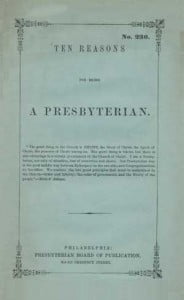Bringing Bibles and Rifles to Worship
It was in uncivilized territory where the Rev. Robert Cooper took his first pastorate in central Pennsylvania. Born in Northern Ireland in 1732, the young man stayed there for the first nine years of his life. When his father died, young Robert accompanied his widowed mother in 1741 to the American colonies across the Atlantic. Following so many of their Scot-Irish race, he studied at the College of New Jersey, now Princeton University, graduating there in 1763. As was common practice in that era, Robert prepared for the ministry by studying theology with a private tutor, and he was ordained to the gospel ministry on November 21, 1765. Within that same year, he was called to Middle Springs Presbyterian Church, just north of Shippensburg, Pennsylvania. He was to remain there for thirty-one years, finally leavening in 1797 due to declining health.
Worship in pre-Revolutionary times was a challenge, due to the presence of hostile native American in their region. The usual items brought to a worship service were a Bible (the Genevan edition, with Calvinistic footnotes), a hymn book (a Psalter for unaccompanied singing of psalms), and a rifle, with ammunition readily available. Their defensive armament would then be stashed at the entrance of the church whenever they would attend church services.
Dr. Cooper remained at Middle Springs for three decades plus. He was a scholar of considerable merit. He had served later on for a brief time in the Revolutionary Army. His interests were of wider influence than the local scene, for he had helped to plan for the first General Assembly of the Presbyterian Church in 1789, at which he was a voting delegate.
He wrote a tract entitled “The Signs of the Times” as well as written messages delivered to the American troops of the Revolutionary Army. He went to be with the Lord on April 5, 1805.
Words to live by: If you remember that the Scots-Irish Presbyterians initially settled in Cumberland County of Pennsylvania, and then after about thirty years began to migrate west and south, we will have a real appreciation for the Rev. Robert Cooper. He no doubt influenced the evangelistic and revival traditions of the Scots-Irish Presbyterians in America. With the danger of Indian attacks ever present as they walked to and from church, or upon their homes while they were away at church, it took real courage to be a Reformed Christian in those days. Increasingly we have our own challenges to faith and life today. Then as now, a firm resolve based upon God’s sure care for each of His children, is necessary in standing for faith and righteousness.

 Ten Reasons for being a Presbyterian.
Ten Reasons for being a Presbyterian.